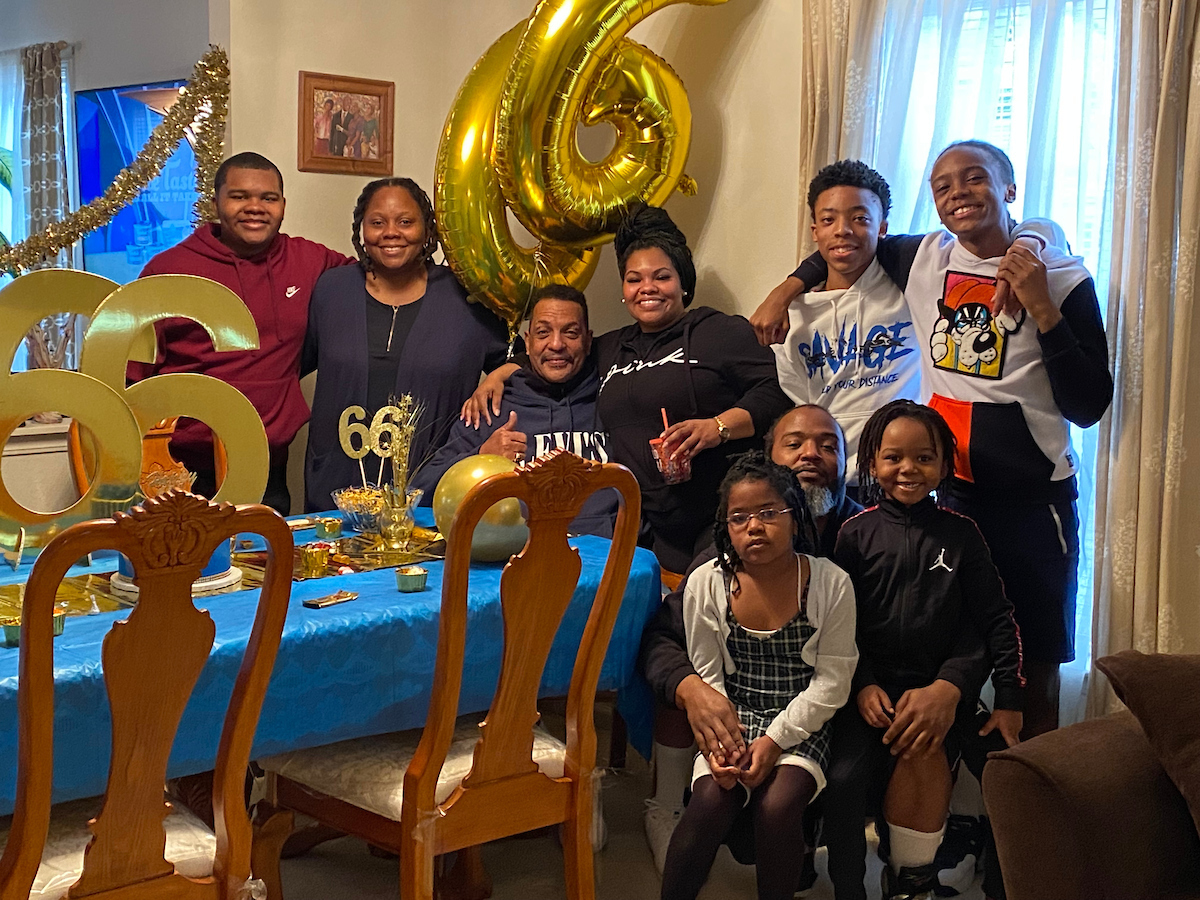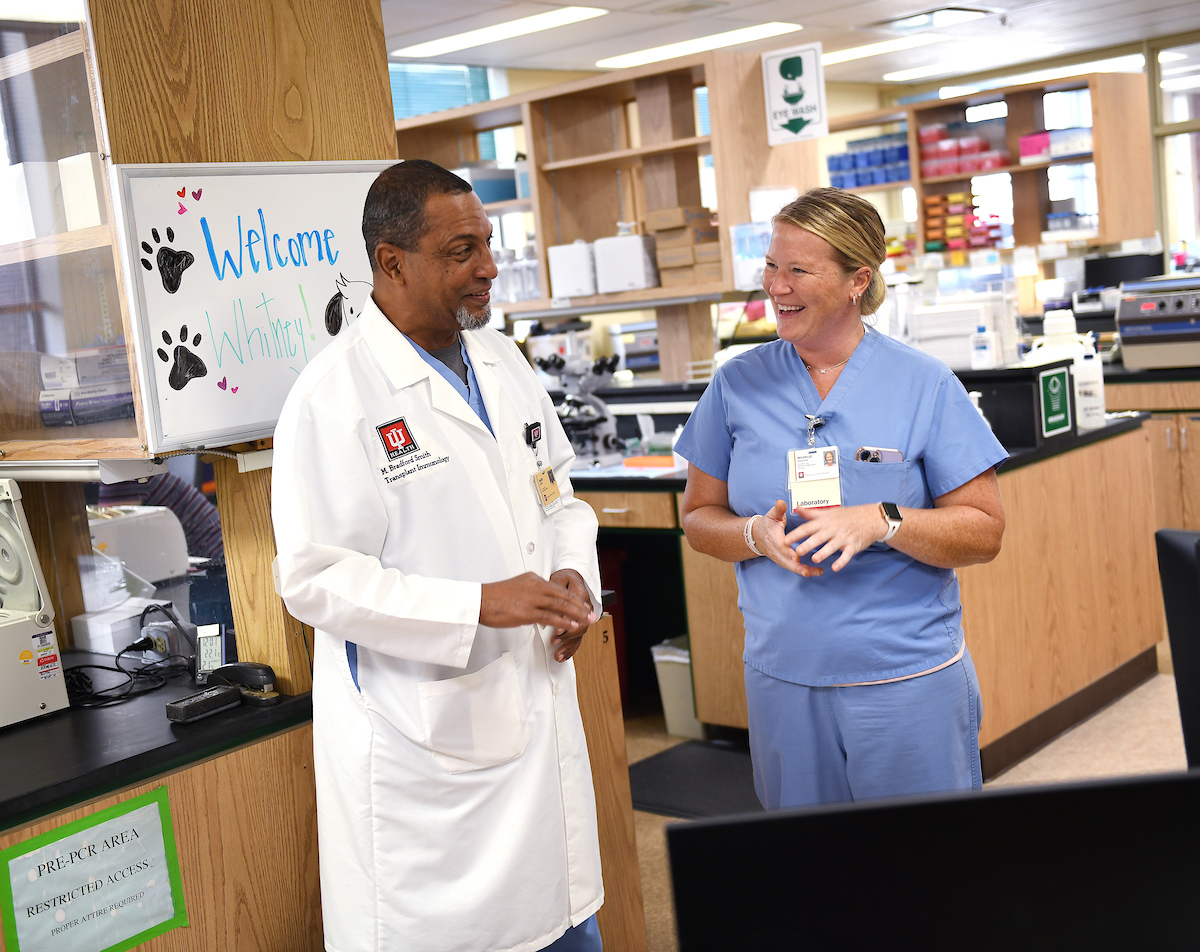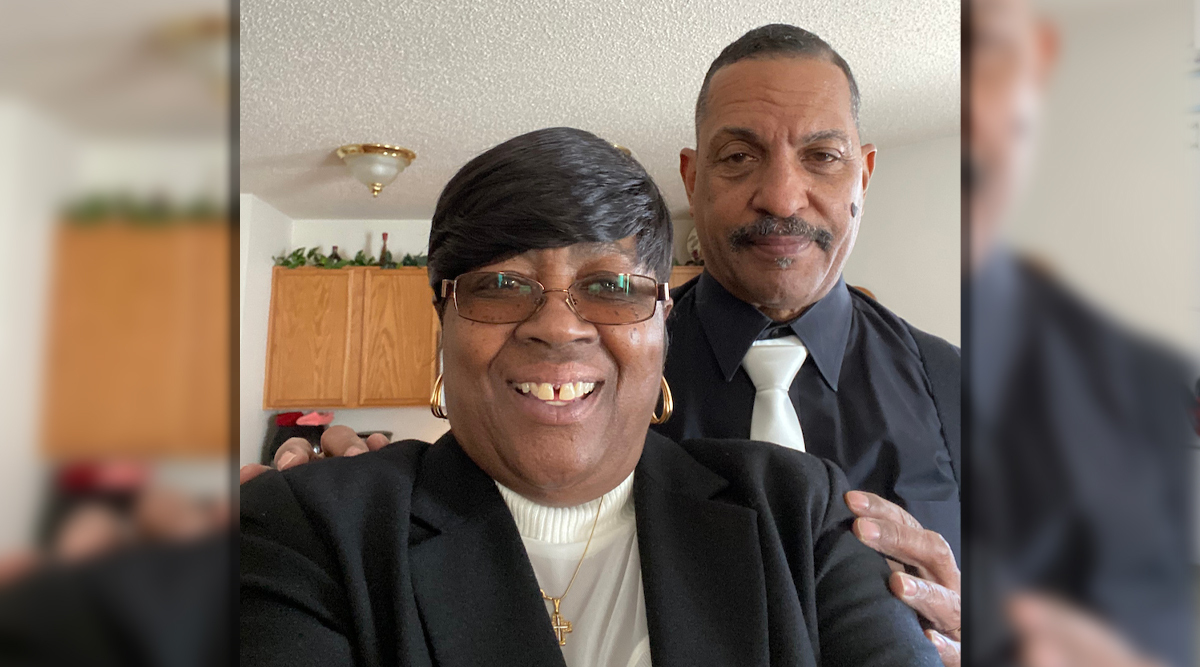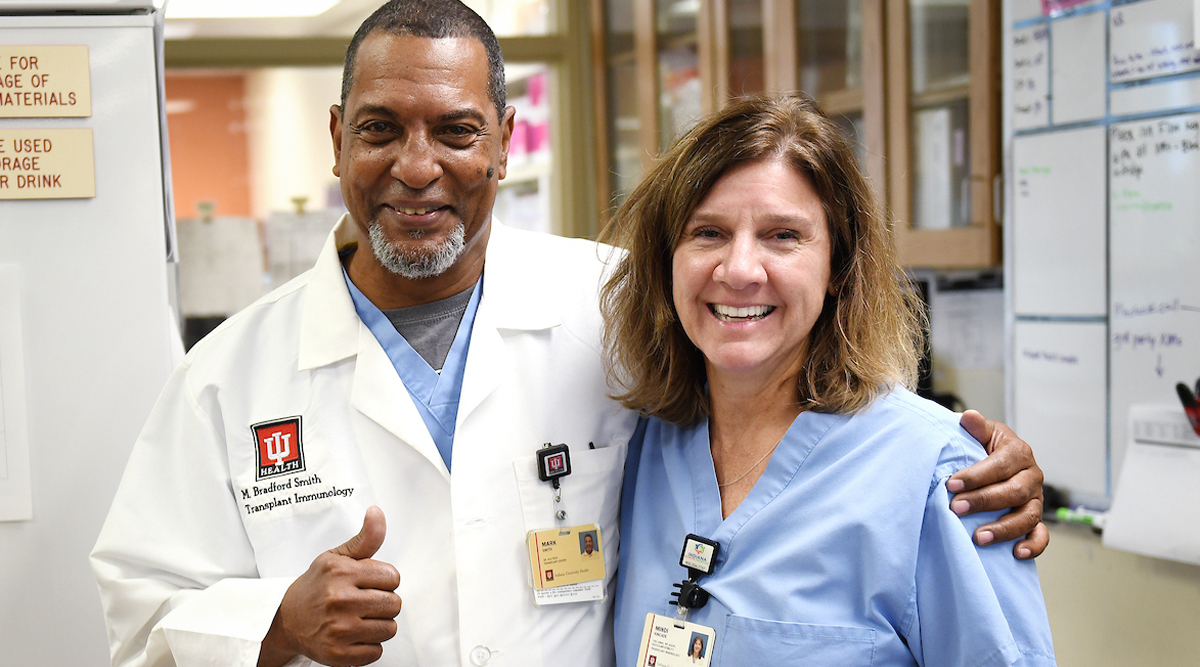Mark Smith has brought a standard of excellence and a sense of purpose to his job in the HLA testing lab since 1975.
By Maureen Gilmer, IU Health senior writer, mgilmer1@iuhealth.org
Mark Bradford Smith is one of those people who makes your day better just by being who he is.
Smith is retiring after nearly a half-century with IU Health (and all of the organizational entities that came before it).
But we’ll get to that in a minute.

First, imagine you’re to meet him for an interview at his lab adjacent to IU Health Methodist Hospital, and you’re unsure where to park amid the construction of the health system’s new Downtown hospital.
No worries. He’ll pop out of the lab, still wearing his white coat, hop in the car with you and direct you around the corner, up one street and down the next until you can pull up to a curbside space about two blocks from his office in Wile Hall.
So, of course, the interview had to start during that car ride and the walk back to the nearly 100-year-old Wile Hall, formerly used as living quarters for new nurses at Methodist.
FROM THE ARMY TO RILEY
“I came home from the Army in 1975,” he says, as we cross busy Capitol Avenue on our way back to his office.
It was near the end of the Vietnam War, and Smith was staying with his mom, not sure what his next move might be.
An employee at Riley Hospital for Children for many years, she suggested he come down to the hospital and participate in a blood drive in the lab where she worked.
While there, he did what a lot of Vietnam vets did when they finished their military commitment. He asked about a job.
Sure enough, there was a position open in the Transplant Immunology HLA (histocompatibility leukocyte antigen) lab, where a small team of people conducted antigen testing/tissue typing of blood samples to prepare for organ transplants.
Smith had no medical background, but he knew a good opportunity when he saw it. He enrolled at IUPUI, earning a degree in immunology/biology while he worked in the lab, first in more of a sterile processing role before taking on more responsibility as a technologist.
MOVE FROM RILEY TO WILE
That lab, housed for decades in the basement of the research wing at Riley, moved to Wile Hall in 2003. For 47 years, he has worked in the HLA testing lab.
“I worked 28 years at Riley, 19 in this building,” he said, as we entered the lab on Wile Hall’s first floor. He laughs when he recalls how he and the lab team adapted to their basement workspace at Riley:
“We painted scenery on the walls to make it look like the outdoors. I was glad to come here and be above ground to see the daylight.”
He does miss seeing the children and families in the hallways and the cafeteria at Riley though.
“I got accustomed to seeing the children and the babies, even outside the transplant world,” he said. “This is more isolating.”
But it’s hard to argue with the sunlight streaming through the windows and the cheerful greetings of his co-workers, most of them a generation or two younger than him.
Smith is 66 now and says the time is right for him to step aside and let the younger folks lead the way.

“Life is not that long, and I’m closer to the end than the beginning. I don’t want them to have to drag me out in a wheelchair or be in a sickbed.”
HAND IN HAND WITH SURGEON
Smith shows off the corner of the busy lab that has been his domain for 17 of the past 19 years. Vials of blood are labeled and waiting for testing, as he explains the process for separating red blood cells from the plasma itself. The blood samples arrive daily from hospitals, clinics, dialysis centers and offices throughout the state and nation.
“The testing we do gives the surgeon the OK to go through with the transplant,” he explained. “Everybody’s hands here help lead the surgeon’s hands in delivering that organ to a person to see them live another five to 10 years. It is critical that we be precise in our data and steadfast in our decisions.”
Back in his early days at Riley, he would visit potential transplant patient family members in their homes to collect blood samples to determine if they might be a donor match.
“We wanted to make it easy and accessible.”

These days, he doesn’t see patients. “Samples come to us in a pneumatic tube, but their blood flows through here,” he said.
And often he gets to hear good news via transplant coordinators and patient stories revealing that surgeries have been successful.
“It’s good to be able to connect with those people in our minds.”
He’ll miss that, of course.
“I’ll miss knowing that I’m helping, that the work I’m doing is extending life for individuals who are facing these types of illnesses,” he said. “I’ve had my hand in that and I’ve given the OK to go through with so many transplants over the years because that’s what we do here in this lab.”
That often meant working nights, weekends and holidays over the years because organ donations are unpredictable.
“I’ve been here night after night after night, day after day, weekends. I have slept in the lab many times because donors come whenever they come. But that’s OK because I know that I’m helping extend someone’s life.”
MINISTER, MENTOR, COACH
So, while this chapter is coming to an end, Smith has plenty of living, ministering and mentoring yet to do. An ordained minister, he preaches for Pentecostal Assemblies of the World and will continue his work with youth. He is an AAU basketball coach for 14- to 16-year-olds and coaches baseball at the Hendricks County YMCA.

He and his wife, Debra, have seven children, 17 grandchildren and four great-grandchildren.
But these people right here in this lab are his other family. They are a tight-knit group, he said, celebrating birthdays, babies, holidays, weddings – any excuse for a party.
Smith, who grew up in Kentucky watching his grandmother bake and his parents do plenty of cooking, learned his way around an oven at an early age.
“I used to be a sweets man,” he said. “I had to get away from that as I got older, but I still love to fix that type of stuff.”
His colleagues appreciate that.

Transplant immunology manager Mindi Kincade, who describes Smith as “a caring and compassionate team member,” said he brings the best birthday treats. Aside from that, he is a lifelong learner, she said.
“He participates in lectures building on his knowledge of HLA and organ transplant. He handles 800-plus patient samples each month with 100% accuracy and efficiency,” Kincade said. “Maintaining sample integrity is the foundation of all subsequent testing that takes place while patients wait for their organs.”
POINT OF PRIDE
And that is what he is most proud of during his career.
“One of the things I prided myself on over these 47 years is being precise with my handling of the specimens and testing,” he said. “I’ve always looked at it as an extension of myself. This is how I would want my situation handled. People can make errors; no one is perfect, but I always strive for that.”
That’s why he agreed to stay on an additional two weeks so he could properly train his young replacements.
“Mindi wants me to give a precise demonstration on how I’ve been able to avoid problems over the years,” Smith said. “I’m proud to do that because I want them to maintain these standards. There’s a right way to do things.”
He credits his semi-retired previous manager, Nancy Higgins, for her guidance and support during his time in the lab at Wile Hall.
“I would be remiss to not make known that it was wonderful being under her leadership during those years,” he said.

And while IU Health’s transplant program has evolved and grown to one of the largest in the nation, Smith says it hasn’t changed in its direction, nor in its care.
“Right now, I think we have close to 2,000 patients on our waiting list for various organs.”
As he prepares to leave his work home of nearly five decades, Smith said his son just hired into the IU Health system, working in nutrition.
“Out with the old, in with the new,” he laughed.
“It’s been a great 47 years. God has placed me in this field, and I wouldn’t trade it for anything,” he said. “But you gotta know when it’s time to go. It’s time to let the new people come on in and be a part of this great experience.”
Photos submitted and by Mike Dickbernd, IU Health visual journalist, mdickbernd@iuhealth.org
